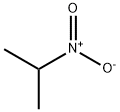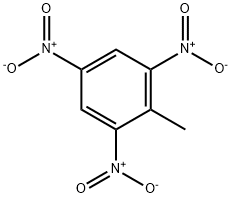2-Nitropropane , 96% , 79-46-9
Synonym(s):
2-(1,8-naphthyridin-2-yl)-Phenol
CAS NO.:79-46-9
Empirical Formula: C3H7NO2
Molecular Weight: 89.09
MDL number: MFCD00007397
EINECS: 201-209-1
PRODUCT Properties
| Melting point: | -93 °C |
| Boiling point: | 120 °C(lit.) |
| Density | 0.992 g/mL at 25 °C(lit.) |
| vapor density | ~3 (vs air) |
| vapor pressure | ~13 mm Hg ( 20 °C) |
| refractive index | n |
| Flash point: | 99 °F |
| storage temp. | Flammables area |
| solubility | H2O: slightly soluble |
| form | Liquid |
| pka | pK1:7.675 (25°C) |
| color | Colorless to Almost colorless |
| Water Solubility | 1.7 g/100 mL (20 ºC) |
| Merck | 14,6628 |
| BRN | 1740684 |
| Henry's Law Constant | 8.92 at 20.00 °C, 15.3 at 30.00 °C, 24.4 at 40.00 °C, 36.9 at 50.00 °C (inert gas stripping, Bene?
and Dohnal, 1999) |
| Exposure limits | Potential occupational carcinogen. NIOSH REL: IDLH 100 ppm; OSHA PEL:
TWA 25 ppm (90 mg/m3); ACGIH TLV: TWA 10 ppm (adopted). |
| Dielectric constant | 25.5 |
| Stability: | Stable. Incompatible with strong oxidizing agents, strong bases, copper. |
| LogP | 1.35 at 20℃ |
| CAS DataBase Reference | 79-46-9(CAS DataBase Reference) |
| IARC | 2B (Vol. 29, Sup 7, 71) 1999 |
| NIST Chemistry Reference | Propane, 2-nitro-(79-46-9) |
| EPA Substance Registry System | 2-Nitropropane (79-46-9) |
Description and Uses
2-Nitropropane, also known as dimethylnitromethane or isonitropropane, is a colourless, oily liquid with a mild and sweet odour. This flammable compound is soluble in water and various organic solvents, including chloroform. Its vapors can form an explosive mixture when combined with air. 2-Nitropropane serves as a co-solvent in paint formulations, enhancing pigment wetting, optimizing flow properties, and facilitating electrostatic processing. Additionally, it contributes to a shorter paint drying time.
2-Nitropropane is primarily used as a solvent for organic compounds and coatings; with vinyl resins, epoxy paints, nitrocellulose, and chlorinated rubber; in printing inks, adhesives, and printing as flexographic inks; maintenance with traffic markings on roads and highways; shipbuilding; and general maintenance. It also has limited use as a paint and varnish remover. 2-Nitropropane is also used as a solvent in food processing industries for fractionation of a partially saturated vegetable oil.
Safety
| Symbol(GHS) |    GHS02,GHS06,GHS08 |
| Signal word | Danger |
| Hazard statements | H226-H302-H331-H341-H350-H412 |
| Precautionary statements | P202-P210-P273-P301+P312-P304+P340+P311-P308+P313 |
| Hazard Codes | T |
| Risk Statements | 45-10-20/22-68-52/53 |
| Safety Statements | 53-45-61-36/37 |
| RIDADR | UN 2608 3/PG 3 |
| WGK Germany | 3 |
| RTECS | TZ5250000 |
| Autoignition Temperature | 802 °F |
| HazardClass | 3.2 |
| PackingGroup | III |
| HS Code | 29042000 |
| Hazardous Substances Data | 79-46-9(Hazardous Substances Data) |
| Toxicity | Acute oral LD50 for rats 720 mg/kg (quoted, RTECS, 1985). |
| IDLA | 100 ppm |
| Limited Quantities | 5.0 L (1.3 gallons) (liquid) |
| Excepted Quantities | Max Inner Pack (30g or 30ml) and Max Outer Pack (1Kg or 1L) |



